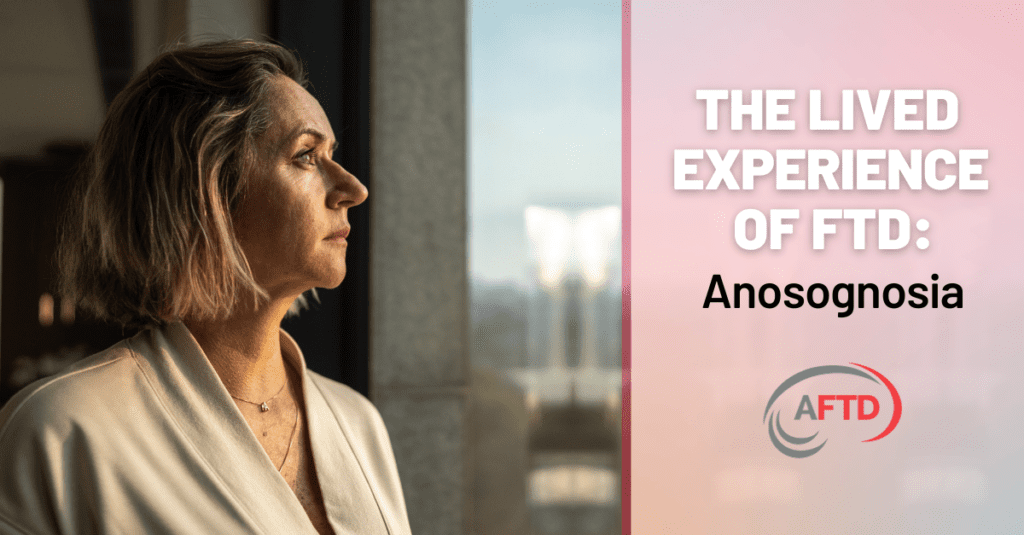The Lived Experience of FTD: Anosognosia

The following article was written by Kevin Rhodes, a member of AFTD’s Persons with FTD Advisory Council. Council members like Kevin and Anne Fargusson, who contributed to this article, work to ensure that the insights and voices of people living with FTD help guide AFTD’s policies, programs, and services.
“What do you mean I have FTD? No I don’t!”
It’s not unusual for persons with FTD to respond like this when told by their loved ones and doctors that they are living with this disease. This is called anosognosia.
Anosognosia is the inability to recognize or perceive one’s illness and its associated limitations. Also referred to as “lack of insight,” anosognosia is a hallmark symptom of FTD, especially behavioral variant FTD.
People who present with anosognosia display a profound lack of emotional concern about their disease and its impact on their family members. Even those who acknowledge they have a brain disorder may deny they are upset or worried about their condition. Anosognosia is one of the main reasons people with FTD refuse medication and medical/personal care. People with anosognosia may be able to function normally in some areas of their lives yet demonstrate risky behavior elsewhere because they do not recognize their limitations.
Many people with FTD are very intelligent. But with anosognosia, it doesn’t matter if people are telling you that something is wrong; you won’t see it until it hits you in the face.
So, are people with anosognosia in denial about their disease? No. There is an important difference between denial and anosognosia. Denial is a psychological defense mechanism, a way of coping with an unpleasant or painful situation. When that situation is resolved, the denial response is no longer needed. Anosognosia is the result of irreversible damage to the brain’s right parietal lobe and/or frontal lobe, the anterior cingulate, and the orbitofrontal cortex. Whereas denial is generally temporary, anosognosia will only worsen as the disease process continues.
Here is an example from Anne Fargusson, a member of the AFTD’s Persons with FTD Advisory Council.
This condition can be very frustrating both for the caregiver and the person with FTD. I know for myself, I didn’t trust anyone in the beginning. You would think that losing two jobs would have woken me up, but I was still fighting. My husband insisted that we sign up for Social Security disability “just in case.” Part of the deal was that I had to be evaluated by their psychiatrist. After 10 minutes, he told me that I couldn’t work, and I argued with him as he was signing the paperwork. For some reason, that was a turning point for me. And it got real. You never know what it will take for someone to come around, but most of the time, they eventually do.
In recent weeks, the person with FTD sunk deeper into his anosognosia. He insisted that he is fine, and that the doctors saying otherwise are crazy. He doesn’t want anyone else going to doctor’s appointments with him, and has even tried to revoke the medical power of attorney. This is driving his family crazy, and now they are having trouble getting him to even see a doctor.
These are very good examples of anosognosia.
When someone is first diagnosed with FTD, it is important for both care partners and those diagnosed to have grace with their loved ones. Care partners should not assume their loved one is in denial, and should work with their medical team to help their loved one understand the impact FTD has on their actions. Persons diagnosed who are not experiencing anosognosia should give themselves space to see that their care partners are trying to help them navigate the FTD diagnosis.
If you suspect that you have a loved one with FTD who is acting like this, please click this link to learn more about anosognosia.
If you need any support in helping to deal with a person with anosognosia, please reach out to the AFTD HelpLine at 866-507-7222 or info@theaftd.org
By Category
Our Newsletters
Stay Informed
Sign up now and stay on top of the latest with our newsletter, event alerts, and more…
